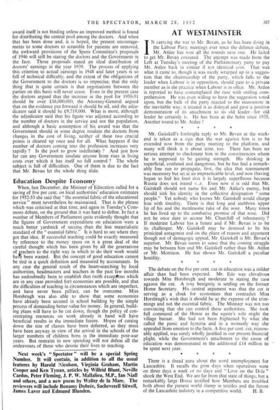AT WESTMINSTER
IN carrying the war to Mr. Bevan, as he has been doing in the Labour Party meetings ever since the defence debate, Mr. Attlee has won all the rounds save one. He failed to get Mr. Bevan censured. The attempt was made from the Left at Tuesday's meeting of the Parliamentary party to pay Mr. Attlee back in similar if not identical coin. That was what it came to, though it was nicely wrapped up in a sugges- tion that the chairmanship of the party, which falls to the leader when Labour is in opposition, should pass to a private member as is the practice when Labour is in office. Mr. Attlee is reported to have contemplated the ruse with smiling com- prehension. He was even willing to have the suggestion voted upon, but the bulk of the party reacted to the manoeuvre in the inevitable way; it treated it as disloyal and gave a positive demonstration of its attachment to its old leader—for old leader he certainly is. He has been at the helm since 1935. Another round to Mr. Attlee !
* * * * Mr. Gaitskell's forthright reply to Mr. Bevan at the week- end is taken as a sign that the war against him is to be extended now from the party meeting to the platform, and many will think it is about time, too. There has been no serious attempt to checkmate him in the constituencies where he is supposed to be gaining strength. His thinking is superficial, confused and dangerous, but he has had a remark- ably free run to propagate, first, the idea that rearmament was necessary but set at an impracticable level, and now (having begun to feel his feet) that it is largely superfluous because Russia does not intend w _.r. Even now it is odd that Mr. Gaitskell should not name his and Mr. Attlee's enemy, but should sink his identity in the collective designation "some people." Yet nobody who knows Mr. Gaitskell would charge him with timidity. There is that long and stubborn upper lip of his and the mettlesome rake of the nose. Many times he has lived up to the combative promise of that nose. Did not he once dare to accuse Mr. Churchill of inhumanity ? If moderate Labour has a future and if Mr. Bevan is to be its challenger, Mr. Gaitskell may be destined to be his prinicipal antagonist and on the plane of reason and argument though not of demagogic appeal, Mr. Gaitskell is Mr. Bevan's superior. Mr. Bevan seems to sense that the coming struggle may be between him and Mr. Gaitskell rather than Mr. Attlee or Mr. Morrison. He has shown Mr. Gaitskell a peculiar hostility.
The debate on the five per cent, cut in education was a milder affair than had been expected. Mr. Ede was chivalrous towards Miss Horsbrugh and moderate in stating the case against the cut. A rosy benignity is settling on the former Home Secretary. His central argument was that the cut is serving as a cloak for economies that contradict Miss Horsbrugh's wish that it should be at the expense of the trim- mings and not the essential fabric. The Minister was not too convincing that she can control these authorities. She took full command of the House as the squire's wife might the village bazaar. She had not been frightened by what she called the panic and hysteria and in a womanly way she appealed from emotion to the facts. A five per cent. cut, reason- ably applied, was surely wholly justified in our present financial plight, while the Government's attachment to the cause of education was demonstrated in the additional £14 million to be spent next year.
There is a dread aura about the word unemployment for Lancashire. It recalls the grim days when operatives were • on three days a week or no days and "Love on the Dole" shook the West End. We are far from that state of things, but a remarkably large House testified how Members are troubled both about the present world slump in textiles and the future of the Lancashire industry in a competitive world. H. B.


































 Previous page
Previous page